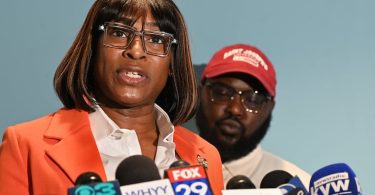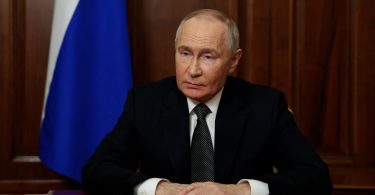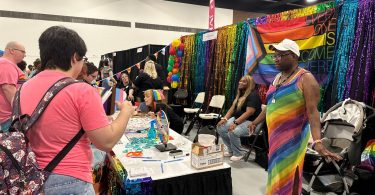Vice President Kamala Harris has eked out a narrow lead in the latest polls, but slim margins in seven key battleground states are still likely to decide the outcome of the election, which experts say will be the closest America has had in decades, if not more than a century.
And LGBTQ voters, who comprise a larger share of the electorate than ever before, are expected to play a major role in November.
The Washington Blade discussed what lies ahead for the Harris team, particularly with respect to LGBTQ constituent engagement, in separate interviews last week with one of the campaign’s gay co-chairs, U.S. Rep. Robert Garcia (D-Calif.), and its national LGBTQ+ engagement director, Sam Alleman.
Criss-crossing the country
With just over a month until Election Day, the Harris-Walz team is in overdrive enlisting key surrogates and staff to fan out across the U.S. With a focus, of course, on Arizona, Georgia, Michigan, Nevada, North Carolina, Pennsylvania and Wisconsin.
“We’ve got to make sure we compete everywhere,” Garcia said. “So wherever I can be, I’ll be.”
The congressman headlined an event with the LGBTQ community in Phoenix on Monday night for Out for Harris, the campaign’s LGBTQ-focused national organizing effort. Queer voters are “always engaging and always asking questions,” he said, eager to discuss “their future and their rights and how dangerous Donald Trump would be for them.”
Garcia said the “best part” about his involvement with the Harris campaign has been traveling the country to connect with these folks. “I actually took 100 local activists from Long Beach, from my community, out to Nevada, with two busses a couple weeks ago, which was great,” he said, “just to go door knocking.”
Up next for the congressman is another trip to Nevada and then to Pennsylvania, he said.
“We’re aiming to have Out for Harris working groups and committees in all 50 states to do this work of mobilizing voters in this critical election to elect Kamala Harris and Tim Walz and defeat Donald Trump and J.D. Vance,” Alleman said.
“We’ve had in-person phone banks in New York, D.C., and California,” while “we have New Jersey and Washington State and Massachusetts hosting in-person events,” he said, explaining that by hitting even places that might “not be part of our pathway to victory,” the campaign is building out the infrastructure to help reach “voters in battleground states and be that surge capacity.”
Additionally, “I can’t say too much just yet, but we’re really, really excited for what we’re planning for Pride in Philadelphia, Phoenix Pride, Las Vegas Pride, Atlanta Pride” — all taking place, Alleman said, in mid-October, by which time voting will have already begun in most of those cities.
“Pride is fun,” and the campaign’s presence in places where the community gathers to celebrate is an exemplification of the “joy” that has become a defining feature of the campaign since Harris was tapped to lead the Democratic ticket on July 21, Alleman said.
Voters have concerns. The campaign wants them to see the contrast.
In his conversations with voters, Garcia said, Project 2025, the 900+ page governing blueprint for a second Trump term, is often top of mind, notwithstanding the former president’s efforts to “skirt or dodge” the extreme plans detailed in the document.
“It’s clear that this is the Donald Trump agenda. I think everyone knows that, and we’re going to continue to hammer home that it’s also very bad for LGBTQ+ people,” he said, noting that Project 2025 contains “all sort of horrible things,” including plans to roll back and revoke rights like LGBTQ-inclusive workplace protections while advancing policies like “book bans [that target] our community in schools.”
More broadly, Garcia said, “there’s no question that Donald Trump is bad for gay people. I mean, look at the Supreme Court…just on the courts alone, how could you argue any differently?”
One could look at everything from Trump’s “positions on trans issues,” to “his authoritarian nature” and his opposition to the Equality Act for evidence that his election would be harmful to the LGBTQ community, Garcia said. “I mean, I could go on and on.”
Alleman echoed those remarks and added that Harris and Walz, by contrast, have fought to expand rights and protections for LGBTQ people throughout their careers, standing up for the community well before doing so was popular or politically advantageous. “Standing with us when it wasn’t necessarily very easy to do,” he said, “speaks volumes to our community, but it also just speaks volumes to their values and to their leadership.”
“In every reality, under almost every other issue that you could talk about, right, Kamala Harris and Tim Walz are fighting for LGBTQ people’s totality of their lives, when it comes to their ability to access healthcare, when it comes to their ability to work with dignity and make a living wage and work in an economy that works for them, rather than big corporations,” he said. “Those are the issues that LGBTQ+ people also care about the most, in addition to their freedoms and the things that are identity or community driven.”
Likewise, Garcia said voters’ concerns about the judiciary extend beyond LGBTQ rights and into issues of reproductive freedom, because they understand that the former president appointed three right-wing justices to the Supreme Court, which led to the 2022 decision scrapping Roe v. Wade’s constitutional protections for abortion. “There’s a lot of conversation about abortion rights,” he said. “I think people understand that that’s where Donald Trump plans to take the country even further into restrictions — so, people are pushing back on that.”
“Vice President Harris has made Roe one of the central pieces of her campaign, because there’s still a lot of folks out there that are just tuning in, that might, you know, have gotten a lot of their information from places like Fox [News] or, you know, misinformation on Facebook or social media,” Garcia said.
“It’s important to get the facts out there,” he added, “to get people out there talking to their neighbors, going door to door — I mean, all of that matters.”
It may not be sexy…
First and foremost, Alleman said, Out for Harris is implementing a robust “national, distributed organizing program [that’s] really oriented around voter contact via phone calls,” which is on track — conservatively — “to do approximately 1.2 million calls before Election Day.”
Alleman added that “the work around these community calls” also involves “taking those calls and turning them to actual organizing that supports their battleground states.” And while “it’s not very sexy,” he stressed that these efforts are “low thrills, high value in terms of talking to voters” because “we are truly committed to getting as many people on the phone that we can across the country, especially in the battleground states, between now and Nov. 5.”
By Oct. 12, he said Out for Harris will have phone banking events every day, “and it’ll be like community-based; Monday is Broadway night, Tuesday is trans folks for Harris, Wednesday is LGBTQ+ women for Harris, Thursday and Saturday are catch-all for [the Human Rights Campaign],” and Friday is yet to-be-determined. (Volunteers can sign up to participate or learn more about the program at kamalaharris.com/out.)
Alleman shared that during a recent Out for Harris Broadway-themed call, “we had like, 3,000 people in attendance. And I want to say there were like 500 or 600 people trying to phone bank with us, and they have their first canvassing trip into Pennsylvania,” which illustrates how the program is working within the campaign to ensure “that these calls are translating into organizing.”
Acknowledging that the relationship between LGBTQ rights and organized religion is complicated, Alleman said that Out for Harris plans to administer trainings and lead an organizing call for faith leaders who have created safe spaces for LGBTQ people or otherwise been supportive of the community, such that the campaign can “make sure we’re leveraging their congregations to get them involved.”
Getting creative
Along with organizing in-person events, joining Pride celebrations, administering phone banks, and working with high-profile surrogates like Garcia to help boost the campaign’s message in the battlegrounds, Alleman highlighted upcoming moves like Out for Harris’s plans to partner with Democratic National Committee to provide toolkits to drag performers.
The goal, he said, is to provide materials and guidance “so they can do this work on their own, at their shows” such as by displaying QR codes for fans to get involved and providing instructions for how they can register to vote.
To contend with the challenge of navigating a “fragmented media market,” Alleman said, the Harris campaign is focused on “relationships and messaging in all the senses and ways.” This means, for instance, maintaining a strong social media game, dispatching folks to do “the relational organizing on the ground,” and “finding the nontraditional messengers” — like drag queens and faith leaders — while also “hitting everyone where we can” with earned media coverage and paid advertising.
Alleman also noted Harris’s appearance on “RuPaul’s Drag Race” for the “All-Stars” finale in June, another example of how the campaign has been creative and strategic with outreach to LGBTQ voters and allies.
Leveraging Harris’s advantage with LGBTQ voters
Alleman stressed that the Harris campaign does not take support from LGBTQ voters for granted. “We have to work to earn these voters’ votes, too. And I think the program we are building is so indicative of that, and it’s truly our goal beyond just LGBTQ+ rights — we’re communicating with voters, LGBTQ+ voters, and equality voters about the full range of our platform and what we’re doing, because we firmly believe it will benefit them. Extraordinarily.”
Often, Alleman said, “we divorce LGBTQ+ experiences and people as if they don’t have the same experiences and desires as everyone else” but the Harris campaign is “making sure that we’re saying where we stand on the LGBTQ+ issues but [also] making sure that we’re not losing sight of the totality of the voter we’re communicating to.”
“LGBTQ+ people are more likely to suffer from housing insecurity, more likely to suffer from food insecurity, more likely to be in poverty, more likely to be homeless as teenagers,” he said, “and all of the work that we’ve done in the inflation Reduction Act and in this administration, and all the things that Kamala Harris has said that she’s going to do [if elected] have direct impacts on the LGBTQ+ community and our ability to live full, authentic lives.”
This means “not just to be out as LGBTQ, which is critically important, but [also] having a government that fully cares for everything that goes into what being an LGBTQ plus person is,” Alleman said.
“The majority of us are voting already for Harris,” Garcia said. “That’s great. But what about our friends and family? Like, can we have those conversations with friends that might be on the fence, or maybe we have family that are independent or are not sure who to vote for — those are the conversations that we need to have [to] explain to our family how electing someone like Donald Trump could actually be very damaging, hurtful, and cause real harm to us.”
“LGBTQ people have a role to play, not only in voting, but in telling our stories and talking to people that have yet to make up their mind on how they’re going to vote,” he said. “People that we know.”
Alleman, likewise, acknowledged that “LGBTQ+ people overwhelmingly support Democratic candidates and overwhelmingly support Kamala Harris,” adding that part of the campaign’s work and his work as LGBTQ+ engagement director is to “capture that energy” and “bring them into our campaign and our movement.”
The Harris campaign has earned the support of every major LGBTQ advocacy group, and in turn has focused on “creating buy-in for” the “state and local partner organizations” along with “our national partners” such that they “feel like this is a place where they can invest their time that is meaningful, to make a difference in their work,” Alleman said.
“We are seeing the Human Rights Campaign make historic investments and cooperate with us, [working] hand in glove with our campaign,” he said.
Alleman noted the campaign’s endorsements from groups like the Center for Black Equity through its c4 Political Action Fund (a first for the organization, which started and runs Black Prides throughout the U.S.), LPAC, the political action committee supporting LGBTQ women and nonbinary candidates (which had not backed a presidential ticket prior to this year), and the National LGBTQ+ Task Force Action Fund, which had not otherwise endorsed a presidential candidate in the last 50 years.
Not only does the support of these groups signal that they understand “what’s at stake” in this election, but also their recognition of the “vehicles and access points where they can see themselves and their people in the work that we’re doing as a campaign and as a party,” Alleman said.
“Empowering the partner organizations that do this work within those subsets of LGBTQ+ communities,” he said, allows the campaign to target and engage with the voter who “comes from one of those different backgrounds or walks of life” in an intersectional manner that acknowledges how “there are LGBTQ voters across every other identity that we do this work in.”
The Trump campaign has taken a different approach to engaging with LGBTQ voters
In April, former first lady Melania Trump headlined a fundraiser for Log Cabin Republicans, the conservative LGBT group, at Mar-a-Lago. And more recently, on Sept. 29, the organization hosted a concert in Nashville by musician Kid Rock that also featured Donald Trump Jr., former Fox News host Kimberly Guilfoyle, and Ric Grenell, the gay diplomat who served as acting director of national intelligence, U.S. ambassador to Germany, and special presidential envoy for Serbia and Kosovo peace negotiations during the Trump administration.
Otherwise and apart from “flashy media things to contact us and reach us” without meaningful follow-through, “I haven’t seen any intentional effort” by the Trump campaign to engage with LGBTQ voters, Alleman said. “I haven’t seen anything on the ground. And I just think it’s so fascinating and interesting that [they claim to] want to do these things, and yet their actions just show how little they care about us as a voting bloc.”
In an emailed statement, Log Cabin Republicans President Charles Moran noted that “As has been widely reported, the RNC and Trump campaign are decentralizing their outreach efforts to involve organizations and groups doing the work to increase efficiency and energize the grassroots, and LGBT voter base is no different.”
“We are one of the fastest growing voting blocs in this country,” Alleman said. “As the data bears out, about eight percent of people identify as LGBTQ+” which equates to “somewhere between 20 and 25 percent of people [aged] 18 to 25” — a group of voters whose support, therefore, one might expect both campaigns to aggressively court.
On “the lack of any real intentional outreach,” by the opponent’s campaign, which may strengthen Harris’s edge with LGBTQ voters, Alleman said, “you know, I’m not mad about it.”
Moran detailed some of his organization’s work on LGBTQ voter outreach and mobilization on behalf of the Trump campaign during this election cycle: “Log Cabin Republicans, the nation’s oldest and largest organization LGBT Republicans, conservatives and our straight allies, is leading the charge on this effort for 2024,” he said, stressing that this comes independently from the “work being done by our nearly 80 chapters in 40 states around the country.”
Last week, he said, LCR announced that the group had “pulled in the leadership of the ‘gays for Kennedy’ folks to build out the outreach to Independents and disaffected Democrats.”
“For months, we’ve been building our messaging and ground team,” Moran said. “On the communications side, we have Outspoken, our long-running digital messaging campaign running at full intensity putting out original content, fact-checking Democratic and media lies, and engaging our voters in the digital realm.”
He continued, “On the ground, we have 9 state-based field directors in the targeted swing-states organizing and coordinating with our chapters and campaigns and party committees on the ground. This team has over 250 events already executed or on the books through Election Day. Finally, we have 9 Trump Unity rallies, our broader campaign coalition name, in swing states. These are full-production events with hundreds of people at each, with high-profile surrogates for each. The first one is actually a week from now in Philadelphia.”
“Democrats want to pretend like nothing is going on, but this couldn’t be further from the truth,” Moran added. “This year, we have the most inclusive GOP platform that welcomes LGBT voters to the table, because we all have an equal stake in the future and prosperity of the nation. Log Cabin Republicans is prepared to take the mantle and run the most comprehensive campaign we ever have.”
Garcia, who agreed with Alleman that the Trump campaign is “not interested” in reaching out to LGBTQ constituents, had an even more pointed take: “I think their base hates them,” he said. “I mean, you see the homophobia.”
From “the attacks on trans people,” to “the attacks on gay history” and “the attacks on gay rights in the workplace,” the congressman said, “there’s nothing to connect with” for LGBTQ constituents.
Homing in on conservative LGBTQ voters who might be inclined to support Trump, Garcia suggested there are not very many of them — apart from “some loud personalities out there” and “a lot of those quote, unquote, Log Cabin Republicans,” who “I think are, you know, more interested in holding power in some cases than helping our own community.”
The congressman added, “I don’t know why they’d be reaching out to gay conservatives when there’s nothing to offer them,” because “what are they going to talk about?” He suggested that maybe some right-leaning LGBTQ folks “are excited about tax cuts for billionaires.”
Story courtesy of the Washington Blade via the National LGBTQ Media Association. The National LGBTQ Media Association represents 13 legacy publications in major markets across the country with a collective readership of more than 400K in print and more than 1 million + online. Learn more here: https://nationallgbtmediaassociation.com/







